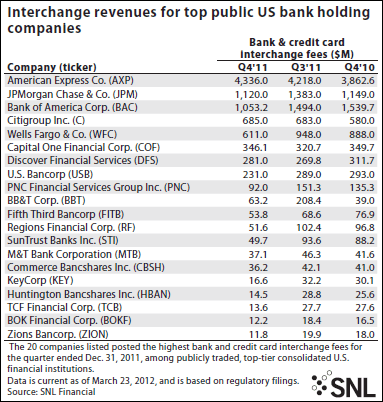How Much Card Issuers Lost from the Debit Fee Limit and why You Should Care

It’s been just over six months since the enactment of the Durbin Amendment (1 Oct 2011) and the data showing its effect on bank revenues are starting to pour in. A new report from SNL Financial, a consultancy, has ranked the top twenty U.S. banks by interchange revenue in the last quarter of 2011 and has looked into the corresponding numbers for Q3 2011 and Q4 2010 for comparison. As expected, some card issuers have been hit very hard, losing hundreds of millions of dollars, while very few have been unaffected.
Why should you care? Well, incidentally, the banks that have suffered the biggest losses were also the first ones to begin experimenting with various fees, including debit card and checking account fees, as they were looking for ways to make up for the lost interchange revenue. We all know how the debit card fee experiment ended, but free checking accounts are now largely gone and overdraft fees are as high as regulations allow. And by the way, these new revenue streams are now being exploited by all issuers, including the ones that were left unharmed by Sen. Durbin’s amendment. However, there have been a couple of positive side effects that can at least partially be attributed to the debit fee cap. Let’s take a look.
BofA, Wells Fargo, JPMorgan Biggest Interchange Losers
The SNL table shows that Bank of America, Wells Fargo and JPMorgan Chase were Sen. Durbin’s biggest victims, with each bank losing hundreds of millions of dollars in interchange revenue on a yearly basis. However, in relation to their size, some smaller banks have suffered much bigger losses. Regions, SunTrust and PNC are prime examples. Here is the full table:

As you see, only three issuers have managed to increase their interchange revenue on a year-over-year basis: American Express, Citibank and BB&T. However, among these three issuers, only American Express has been entirely unaffected, simply because it does not issue debit cards. BB&T’s Q4 2011 debit card fee revenue, on the other hand, was down by 46 percent from its Q3 2011 level, falling from $78 million to $42 million. And as you see, Citi’s Q4 2011 revenue, while considerably higher than the Q4 2010 figure, is virtually unchanged from the Q3 2011 level.
When you scroll down the list, you see that every single issuer in the bottom half of the table has lost a lot of revenue. In fact, the smaller issuers would have topped the table, if the ranking were done by relative losses.
Durbin’s Aftermath
The SNL report isn’t really telling us anything we didn’t already know. We knew that the Durbin Amendment would cost card issuers billions of dollars annually and we knew that consumers would end up paying for it, one way or another. And that’s been happening.
However, Americans have benefited from some unexpected positive developments that can also be linked to the Durbin Amendment. Consumers with higher credit scores, who are typically also the more affluent ones, have been the recipients of credit card offers featuring some incredibly attractive sign-up bonuses and rewards programs. Consumers lower on the credit score (and income) ladder, on the other hand, have benefited from much improved prepaid card programs (most notably the American Express prepaid card). How are these two developments linked to the debit interchange cap? Well, as revenues from debit interchange fees have plummeted, issuers have been doing their best to drive Americans away from debit and towards the more profitable credit and prepaid cards. I expect this process to continue for some time.
The Takeaway
The Durbin Amendment has transformed the payment card landscape. Credit card programs are better than ever and prepaid cards are now as close to debit as they can come. And yet, your choice of a payment card should be unaffected by these events. Credit cards were and remain the best payment option out there. If you spend within your means and pay off the entire outstanding balance at the end of each month, you are in fact being paid for using your credit card. Not only have you had access to interest-free money for 20 – 25 days (from the statement’s closing date to the payment due date), but you have also collected whatever type of rewards your issuer is giving you. And you are building your credit history in the process. No other type of card offers such benefits.
So everyone who can manage credit well should only be using a debit card as a back-up option and prepaid cards should only be used by consumers who are cut off from the financial system altogether.
Image credit: Wikimedia Commons.



The Durbin Amendment should never have been passed. There is absolutely nothing that shows any positive effect from it, there wasn’t any reason to believe that there would be and it is unlikely that there will be.
Sam,
I agree with you, nothing positive has come out of the Durbin Amendment.
I never realized that American Express was so much bigger than the other issuers. So they pull in 4 times as much interchange revenue as the second biggest issuer and about as much as the other banks in the top 10 combined. What’s even more amazing is that, big as they are, they got off completely scot free from the interchange reform. How did that happen?
Tom,
Yes, American Express are completely isolated, because they don’t issue any debit cards.
I’d be totally fine with the banks taking a hit if the retailers had passed some of their savings on to their customers, in the form of lower prices, but I don’t see that. So what happened is that the retailers were the beneficiaries of a windfall, but we are the ones who will be paying for it.
Jeff,
Yes, you are correct and it will be a big bill.
The Durbin Amendment is hitting the smaller banks much harder relative to their size than the bigger ones, so I wonder if that will help lead to more bank failures than we would have seen otherwise. I read somewhere that some of the even smaller banks are doing their best not to grow to fast to avoid getting bigger than $10 billion in assets and that can’t be good.
Peter,
Yes, there are reports that the smaller banks are watching their growth closely and for a good reason.
I have absolutely no problem with the banks losing revenue. They were never made to suffer the consequences of their actions that brought all of us in the mess we are still in and the interchange limit seems to be the only penalty they are paying. It may be unrelated, but it is nevertheless fully deserved.
Jamie,
I understand your position, but the problem is that we the consumers will end up paying for all that, not the banks.
As others have pointed out, we haven’t seen retail prices fall at all, as the merchants and their lobbyist were telling anyone who would listen. So while I have no sympathy with the bankers, I think that the retailers should be made to keep their pre-reform promises, although I just don’t see how this can be done.
I am one of the recipients of the credit card offers with great sign-up bonuses which you have mentioned and have responded to one of them – a Chase card with a $300 bonus. So the way I see it, consumers have actually benefited in that banks have been forced to make their credit card rewards programs more attractive.
Katie,
Yes, consumers with good credit scores have benefited from some amazing credit card offers, but remember that most Americans are not getting them.
These are very interesting numbers you have quoted. The small issuers have really been hit hard. Now retailers are suing the Federal Reserve to get them to lower the debit interchange even further and if they win, the smaller banks would be in trouble.